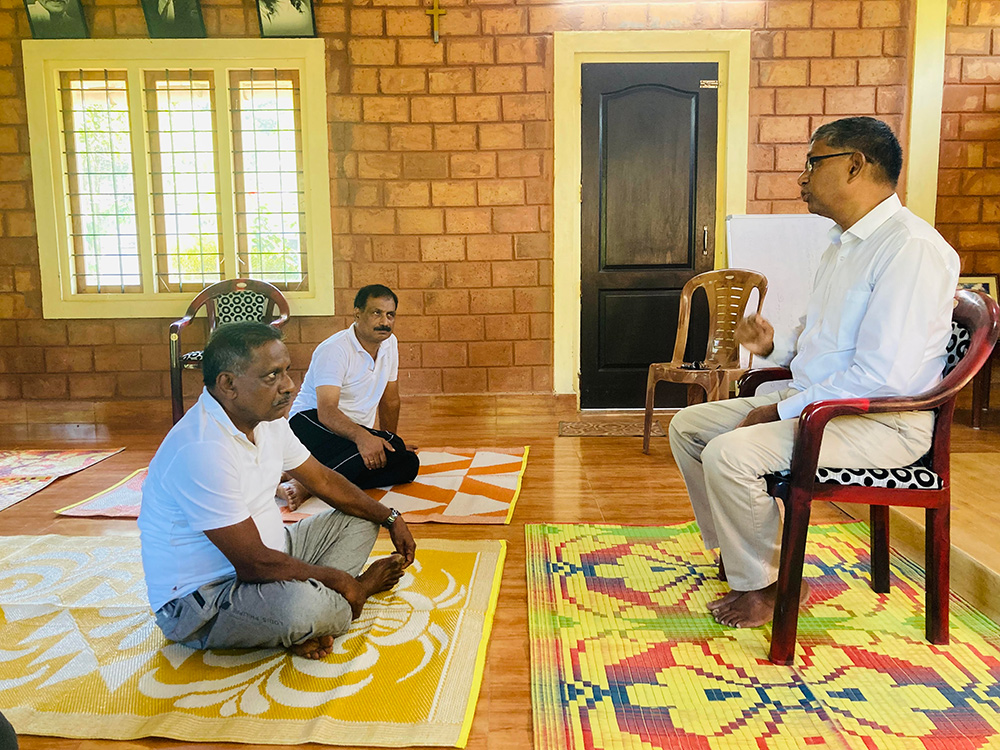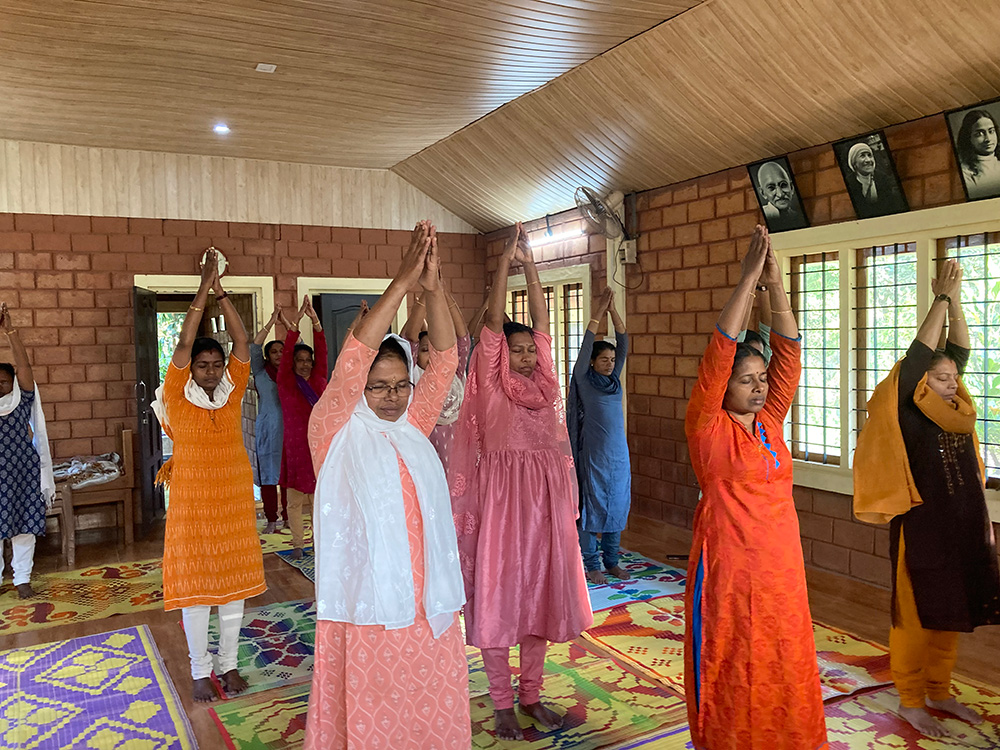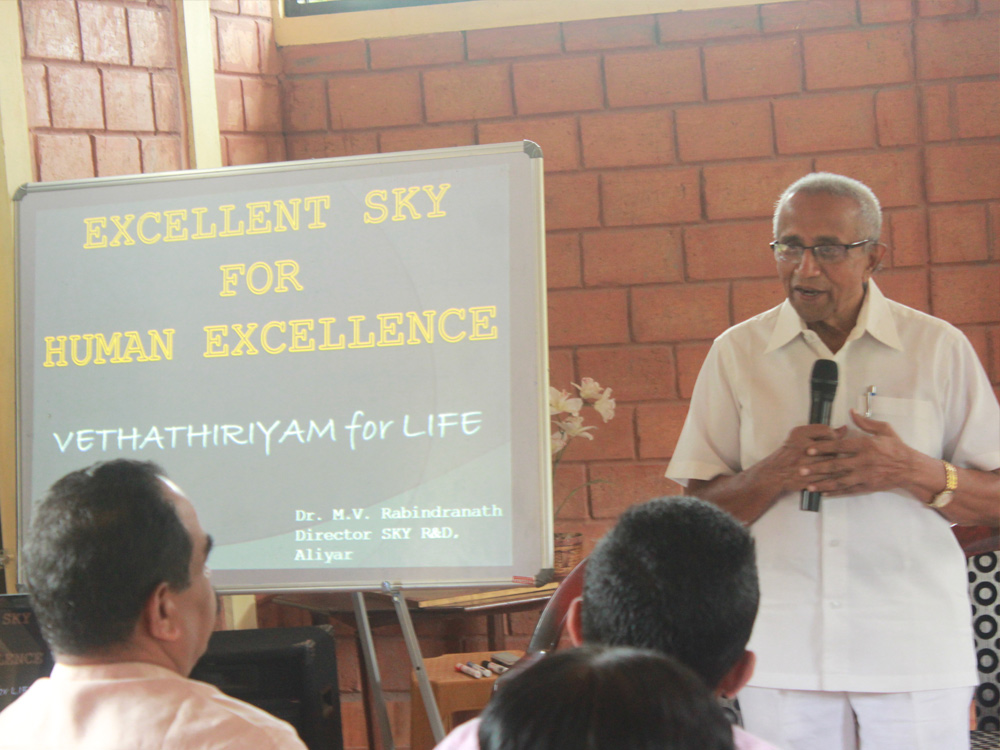Human Excellence Program
Physical Fitness
Mental Agility
Inner Transformation
|
Human Excellence Program
Human Excellence Program is a process that leads to inner transformation. Transformation is the power of love—spiritual energy—in action. It is the empowering of inner energy directed towards the rapid evolution of consciousness. Ancient wisdom affirms and modern research confirms that the unfoldment of consciousness is the main impetus behind a happy and successful life. By undergoing the human excellence programme, everyone get equipped to achieve this in their own life and make a positive impact on the world around us.

The Human Excellence Program works at five levels:
- Physical Fitness
- Self Awareness
- Mental Agility
- Loving & Compassionate Mind
- Ethical & Moral Consciousness
Physical Fitness
Physical Fitness describes our ability to carryout the day’s activities without undue fatigue. Physical fitness indicates the general state of health or, specifically, the ability to perform the aspects of one’s occupation. This is achieved through correct exercise, nutrition, self-awareness and relaxation.
Physical fitness can be achieved through the practice of yoga, meditation, introspection ( self awareness) and food awareness . The following are the ways in which these practices support physical fitness:
1. Yoga: Practicing yoga can help improve physical fitness by increasing strength, flexibility, balance, and endurance. It can also promote relaxation and reduce stress, which do have positive effects on physical as well as mental health.
2. Meditation: Meditation can help achieving a calm and composed mind, promote self awareness, reduce stress and improve sleep quality. By practicing meditation along with yoga exercises, individuals can promote overall physical and mental well-being, which contribute to improved physical fitness.

3. Food & Self Awareness and Discipline: Nutrition plays a significant role in physical fitness. Food awareness involves paying attention to the types of foods and nutrients that you consume, while food discipline involves following a structured diet plan and sticking to it consistently. By being mindful of what we eat and maintaining a healthy diet, we can optimize their physical fitness.
In conclusion, combining the practices of yoga, meditation, and food awareness and discipline help individuals achieve their desired level of physical fitness. These practices do promote physical and mental well-being which lasts throughout one’s lifetime
Self Awareness
Self-awareness refers to the ability to recognize and understand one’s own thoughts, emotions, and behaviors. It can be divided into three dimensions:
1. Internal self-awareness: This involves understanding one’s own thoughts, emotions, and feelings.
2. External self-awareness: This involves understanding how one’s behavior impacts others and the environment.
3. Spiritual self-awareness: This involves understanding one’s values, beliefs, and purpose in life matches with universal principles ( Dharma).
Ways of cultivating and boosting self-awareness through meditation and introspection include:
1. Mindfulness meditation: This involves focusing one’s attention on the present moment and being aware of one’s thoughts, emotions, and sensations. By practicing mindfulness meditation, individuals can become more aware of their own thought patterns and emotional reactions.
2. Aperceptive meditation: This involves focusing attention on one’s own life force rather than focusing mind on any object or sound form ( Manthra) thereby systematically reducing brain wave frequency leading to greater levels of calmness and inner strength.
3. Introspection & Journaling: This involves self reflection and writing down one’s thoughts, feelings, and experiences. By reflecting on one’s journal entries, individuals can gain greater insights into their own behavior and thought patterns leading to appropriate corrective steps.
4. Reflective thinking: This involves taking time to reflect on one’s own experiences and behavior. By doing this, individuals can gain a deeper understanding of own thought patterns and their motivations.
5. Seeking feedback: This involves asking others for honest feedback on one’s behavior and performance. By being open to constructive criticism, individuals can gain a greater understanding of how their actions impact others.
In conclusion, cultivating self-awareness is a crucial step towards personal growth and development. Through practices like meditation, journaling, and reflective thinking, individuals can gain greater insights into their own behavior and thought patterns, leading to improved self-awareness and overall well-being.
Mental Agility
Mental agility refers to the ability to think quickly, flexibly, and creatively. It involves being able to adapt to changing circumstances and solve problems efficiently. Mental agility can be developed through various mental exercises, including meditation and self-awareness practices.
Here’s how meditation and self-awareness practices can support the development of mental agility:
1. Focus: Meditation helps improve focus by training the brain to focus on a single object or thought, such as the breath. This focus can increase mental agility by sharpening one’s ability to concentrate on a task or problem.
2. Mindfulness: Mindfulness meditation fosters self-awareness by encouraging individuals to observe and accept their thoughts and emotions without judgment. This helps develop a flexible mindset by enabling individuals to consider different perspectives and adapt to new situations.
3. Stress reduction: Meditation and self-awareness practices can help reduce stress, anxiety, and other negative emotions that can impair mental agility. By reducing the emotional strain on the brain, individuals can think more clearly and creatively.
4. Creative thinking: Meditation can promote creative thinking by encouraging individuals to let go of habitual, limiting thought patterns and consider new ideas. It provides an outlet for exploring and understanding new concepts without the usual constraints of daily life.
By practicing meditation and self-awareness techniques, individuals can strengthen their mental agility and build their problem-solving skillset. These techniques can help individuals become more adaptable and resilient, better equipped to handle life’s challenges with ease and confidence.
Loving & Compassionate Mind
A loving and compassionate mind can be cultivated through meditation, introspection, and self-awareness practices. These practices are aimed at developing a deeper understanding of one’s thoughts, emotions, and actions, and cultivating a compassionate attitude towards oneself and others.
Meditation, in particular, is known to enhance positive emotions such as love, kindness, and compassion towards oneself and others. Loving-kindness meditation, for instance, involves focusing on sending love, warmth, and kindness towards oneself, loved ones, difficult people, and all beings. This practice helps individuals develop a kind and caring attitude towards themselves and others, increasing empathy and compassion.
Introspection and self-awareness practices help individuals to become more mindful of their thoughts, emotions, and behaviors, which enables them to regulate them more effectively. As people become more self-aware, they develop greater empathy and understanding for themselves and others. This self-compassion helps people to be more loving and caring not just towards themselves but also towards others.
Through meditation, introspection, and self-awareness practices, individuals can cultivate a loving and compassionate mind. They become more empathetic, understanding, and non-judgmental towards themselves and others, leading to deeper relationships, positive mental health, and overall well-being.
Ethical & Moral Consciousness
Meditation, introspection, and self-awareness processes can enhance ethical and moral consciousness in several ways:
1. Cultivate empathy and compassion: These practices can help individuals develop greater empathy and compassion for others, which is an essential component of ethical behavior. As individuals become more aware of their own thoughts, feelings and emotions, they also become more attuned to the experiences of others, leading to a greater sense of connection and understanding.
2. Increase self-awareness: Through meditation, introspection, and self-awareness practices, individuals can better understand their own biases, limitations, and values. This deeper understanding can help individuals make more moral and ethical decisions, as they are better equipped to recognize situations where their actions may not align with their beliefs.
3. Improve emotional regulation: These practices can help individuals manage their emotions and reactions more effectively, allowing them to respond to situations in a way that aligns with their ethical and moral values. By learning to regulate their emotions, individuals are less likely to react impulsively and more likely to act in an ethical and moral manner.

4. Develop a strong sense of personal responsibility: By focusing on their own growth and development, individuals are able to take responsibility for their actions and their impact on others. This sense of responsibility can also extend to larger social issues, such as environmental sustainability or social justice.
Overall, meditation, introspection, and self-awareness practices can help individuals develop a greater sense of ethical and moral consciousness by cultivating empathy, self-awareness, emotional regulation, and personal responsibility.
Talk to us
Have any questions? We are always open to talk about the way we can improve your health.

